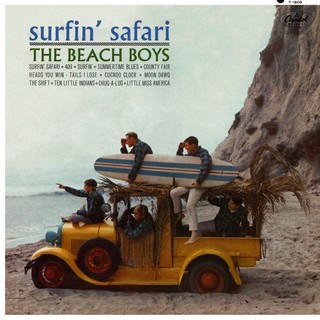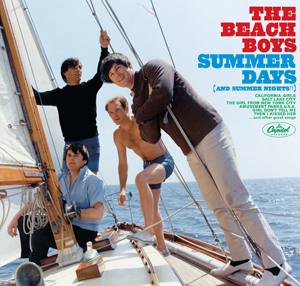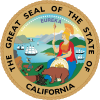
The Beach Boys are an American rock band formed in Hawthorne, California in 1961. The group's original lineup consisted of brothers Brian, Dennis, and Carl Wilson, their cousin Mike Love, and their friend Al Jardine. Distinguished by their vocal harmonies and early surf songs, they are one of the most influential acts of the rock era. The band drew on the music of jazz-based vocal groups, 1950s rock and roll, and black R&B to create their unique sound, and with Brian as composer, arranger, producer, and de facto leader, they often incorporated classical elements and unconventional recording techniques in innovative ways.
Art rock is a subgenre of rock music that generally reflects a challenging or avant-garde approach to rock, or which makes use of modernist, experimental, or unconventional elements. Art rock aspires to elevate rock from entertainment to an artistic statement, opting for a more experimental and conceptual outlook on music. Influences may be drawn from genres such as experimental rock, avant-garde music, classical music, and jazz.

Brian Douglas Wilson is an American musician, singer, songwriter, and record producer who co-founded the Beach Boys. After signing with Capitol Records in 1962, Wilson wrote or co-wrote more than two dozen Top 40 hits for the group. In addition to his unorthodox approaches to pop composition and mastery of recording techniques, Wilson is known for his lifelong struggles with mental illness. He is often referred to as a genius and is widely acknowledged as one of the most innovative and significant songwriters of the late 20th century.

Pet Sounds is the 11th studio album by the American rock band the Beach Boys, released May 16, 1966 on Capitol Records. It initially met with a lukewarm critical and commercial response in the United States, peaking at number 10 on Billboard Top LPs chart, lower than the band's preceding albums. In the United Kingdom, the album was hailed by critics and peaked at number 2 in the UK Top 40 Albums Chart, remaining among the top ten positions for six months. Promoted as "the most progressive pop album ever", Pet Sounds attracted recognition for its ambitious recording and sophisticated music. It is widely considered to be among the most influential albums in the history of music.

Surf music is a subgenre of rock music associated with surf culture, particularly as found in Southern California. It was especially popular from 1962 to 1964 in two major forms. The first is instrumental surf, distinguished by reverb-drenched electric guitars played to evoke the sound of crashing waves, largely pioneered by Dick Dale and the Del-Tones. The second is vocal surf, which took elements of the original surf sound and added vocal harmonies, a movement led by the Beach Boys.

Surfin' Safari is the debut album by American rock band the Beach Boys, released on October 1, 1962 on Capitol Records. The official production credit went to Nick Venet, though it was Brian Wilson with his father Murry who contributed substantially to the album's production; Brian also wrote or co-wrote nine of its 12 tracks. The album peaked at No. 32 in its 37-week run on the US charts.

Surfin' U.S.A. is the second album by the American rock band the Beach Boys, released March 25, 1963 on Capitol Records. It reached number two in the US, lasting 78 weeks on the Billboard album chart, eventually being certified gold by the RIAA, and brought the group newfound national success. It was led by one single, its title track with the B-side "Shut Down". In the United Kingdom, the album was belatedly released in late 1965, reaching number 17.

The Beach Boys Today! is the eighth studio album by the American rock band the Beach Boys, released on March 8, 1965. The album signaled a departure from their previous records with its orchestral approach, intimate subject matter, and abandonment of themes related to surfing, cars, or superficial love. It peaked at number four on US record charts during a 50-week chart stay and was preceded by the top 10 singles "When I Grow Up " and "Dance, Dance, Dance", along with "Do You Wanna Dance?" which reached number 12. When issued in the UK one year later, Today! peaked at number six.
Sunshine pop is a subgenre of pop music that originated in Southern California in the mid-1960s. Rooted in easy listening and advertising jingles, sunshine pop acts combined nostalgic or anxious moods with "an appreciation for the beauty of the world". It largely consisted of lesser-known artists who imitated more popular groups such as the Mamas & the Papas and the 5th Dimension. While the Beach Boys are noted as prominent influences, virtually none of the band's own music was representative of the genre.

"God Only Knows" is a song written by Brian Wilson and Tony Asher for American rock band the Beach Boys, released in May 1966 on the group's album Pet Sounds. Two months later, it was released as the B-side of "Wouldn't It Be Nice" in the United States. In other countries, "God Only Knows" was the single's A-side, peaking at number 2 on the UK Singles Chart.

"Surf's Up" is a song written by Brian Wilson and Van Dyke Parks for American rock band the Beach Boys. Its title is an ironic nod to the group's earlier associations with surf music; nothing in the song is about surfing. Through its stream of consciousness lyric, the song details a man who experiences a spiritual awakening, resigns himself to God and the joy of enlightenment, and prophesies an optimistic hope for those who can capture the innocence of youth.

"Surfin'" is a song by American rock band the Beach Boys, written by Brian Wilson and Mike Love. It was released as the first Beach Boys single in November 1961 on Candix Records and it later appeared on the 1962 album Surfin' Safari.
"Rio Grande" is a psychedelic western saga co-written by Brian Wilson and Andy Paley and co-produced by Brian Wilson and Lenny Waronker for Brian Wilson's first solo album. Its modular set of movements hearkened back to the style that Brian Wilson used during the "Good Vibrations"/Smile era with musique concrète. "Rio Grande" was evidence that he could still create brilliant, pictorial landscapes of music similar to Smile whenever he had the freedom, confidence, and courage to do so. It is the longest piece of music in the Brian Wilson catalogue at eight minutes and 12 seconds.

Summer Days is the ninth studio album by American rock band the Beach Boys, released on July 5, 1965, on Capitol. The band's previous album, The Beach Boys Today!, represented a departure for the group through its abandonment of themes related to surfing, cars, and teenage love, but it sold below Capitol's expectations. In response, the label pressured the group to produce bigger hits. Summer Days thus returned the band's music to simpler themes for one last album, with Brian combining Capitol's commercial demands with his artistic calling.

Smile is an unfinished album by American rock band the Beach Boys that was planned to follow their 11th studio album, Pet Sounds (1966). It was to be a twelve-track concept LP assembled from short, interchangeable musical fragments similar to the group's 1966 single "Good Vibrations". Instead, in September 1967, the group released Smiley Smile, a downscaled version. Over the next four decades, few of the original Smile tracks were officially released, and the project came to be regarded as the most "legendary" unreleased album in the history of popular music.
Progressive pop is pop music that attempts to break with the genre's standard formula, or an offshoot of the progressive rock genre that was commonly heard on AM radio in the 1970s and 1980s. It was originally termed for the early progressive rock of the 1960s. Some stylistic features of progressive pop include changes in key and rhythm, experiments with larger forms, and unexpected, disruptive, or ironic treatments of past conventions.
California Music was a loosely organized American rock supergroup comprising Los Angeles-based studio musicians Bruce Johnston, Terry Melcher, Gary Usher, Curt Boettcher, and Brian Wilson.
Domenic Priore is an American author, historian and television producer whose focus is on popular music and its attendant youth culture.

The Beach Boys' failure to complete the album Smile is often reported as a pivotal episode marking the professional decline of the band and its leader Brian Wilson. Some of the difficulties and pressures surrounding the album's making included its cumbersome editing process, concerns over its potential reception, the Wilson family's resentment of Brian's new social circle, Carl Wilson's arrest for draft evasion, the band's attempt to terminate their contract with Capitol Records, their heavy marijuana consumption, and Brian's escalating mental health issues and creative dissatisfaction.
"Brian Wilson is a genius" is a tagline referencing the Beach Boys' leader Brian Wilson. It was created by the Beatles' former press officer Derek Taylor in 1966, who was then employed as the Beach Boys' publicist, although there are earlier documented expressions of the statement. Taylor frequently called Wilson "genius" as part of a campaign he initiated to rebrand the group and legitimize Wilson as a serious artist on par with the Beatles and Bob Dylan. The resultant hype bore a number of unintended consequences for the band's reputation and internal dynamic, and has been credited as a contributing factor to Wilson's professional and psychological decline.
















